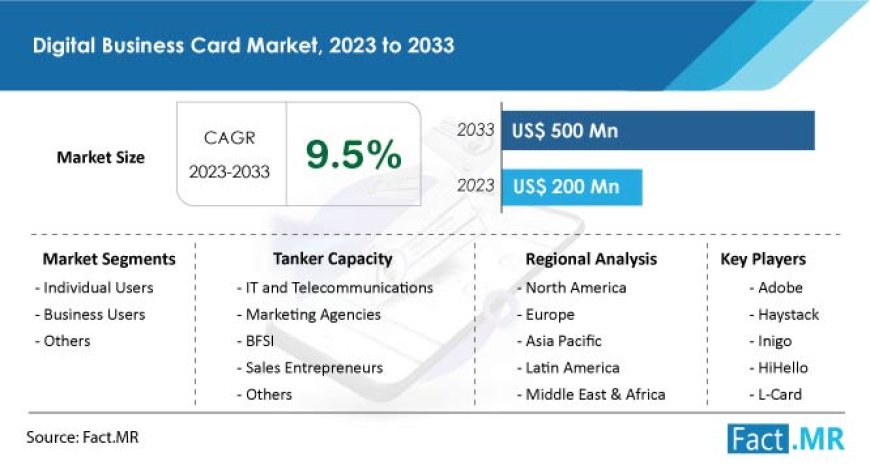Digital Business Card Market is Estimated to Hit US$ 500 million by 2033

According to a new market study by Fact.MR, a market research and competitive intelligence provider, the global digital business card market is projected to reach US$ 500 million by 2033, expanding rapidly at a CAGR of 9.5% from 2023 to 2033.
A digital business card, also known as an electronic or virtual business card, is a method of sharing contact information online. These cards can be created on various devices, including Android, iPad, iPhone, or computer, and are often more cost-effective than paper versions. Similar to traditional business cards, digital business cards can be created, modified, and shared with anyone, but they offer unlimited space for information, allowing users to include as much or as little detail as they wish.
Get a Free Sample Report to Enhance Your Profit Margins: https://www.factmr.com/connectus/sample?flag=S&rep_id=8508
In addition to contact information (such as name, phone number, email, and company), a user can enhance a card with a photo or video, a logo, social media profiles, and more. This information can be displayed in various languages, depending on user preferences. Digital business cards can be shared via email, text (SMS), Facebook Messenger, Telegram, QR code, Twitter, WhatsApp, LinkedIn, and Facebook, among other channels.
Key Takeaways from Market Study
- The global digital business card market is valued at US$ 200 million in 2023.
- Worldwide demand for digital business cards is forecasted to surge at a CAGR of 9.5% during the forecast period (2023 to 2033).
- The digital business card market is set to reach US$ 500 million by 2033.
- North America is projected to lead the global digital business card market over the next ten years.
- “Digital business cards are set to experience enormous demand growth due to their many advantages such as convenience, affordability, environmental friendliness, contactless functionality, and customization options,” says a Fact.MR analyst.
One significant advantage of digital business cards over conventional business cards is their ability to integrate unique features and functions, such as instant contact saving to a CRM system or phone book, quick access to web pages, or QR codes that track interactions or direct recipients to a map location.
Get Customization on this Report for Specific Research Solutions: https://www.factmr.com/connectus/sample?flag=RC&rep_id=8508
Competitive Landscape
The global market is becoming increasingly competitive with a growing number of participants. Key players in the electronic business card market are focusing on collaborations, mergers and acquisitions, product/technology releases, and expansion. Leading players are making significant investments to accelerate the creation of innovative digital business cards.
Top Key Players are Adobe, Haystack, Techno Infonet, Inigo, SnapDat, L-Card, HiHello, Dibiz, OrangeTreeApps, Switchit, Mobilo Card, CamCard
For example, Adobe partnered with Meta, Mastercard, and Etsy in October 2022 to develop digital solutions for small and medium-sized businesses, providing them access to Adobe’s document cloud and creative cloud.
Digital business cards are highly adaptable, allowing users to update details, addresses, contacts, and other information, notifying everyone who has the card of any changes. They solve various issues associated with traditional business cards and reduce the costs of printing paper cards. These advantages are driving the adoption of digital business cards.
Regional Analysis
North America is dominating the global digital business card market, with the United States leading the region due to the presence of several major market players. In the Asia Pacific region, countries like India, South Korea, and Japan are significantly contributing to market growth due to rapid digitization. The European market is also experiencing considerable growth due to the increasing need for advanced digital solutions in the United Kingdom and Germany.
Key Segments of Digital Business Card Industry Research
By User Type:
- Individual Users
- Business Users
- Others
By Platform:
- Android
- iOS
- Windows
By End User:
- IT and Telecommunications
- Marketing Agencies
- BFSI
- Sales Entrepreneurs
- Others
By Region:
- North America
- Latin America
- Europe
- Asia Pacific & China
- Middle East & Africa

 swatichaudhari
swatichaudhari 










